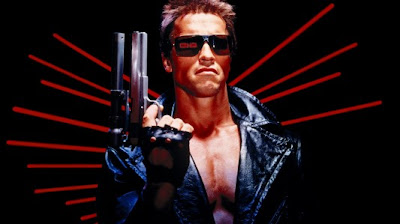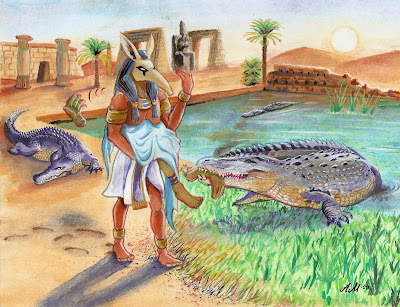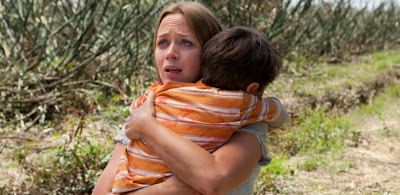 |
| Old Joe and Young Joe |
"This is my life now, I earned it, you've had yours already. So why don't you do what old men do and die? Get the fuck out of my way." — Young Joe, "Looper"
"And he spake also a parable unto them; No man putteth a piece of a new garment upon an old; if otherwise, then both the new maketh a rent, and the piece that was taken out of the new agreeth not with the old. And no man putteth new wine into old bottles; else the new wine will burst the bottles, and be spilled, and the bottles shall perish. But new wine must be put into new bottles; and both are preserved." —Luke 5:36-38, KJV"Looper" is a movie ostensibly about time travel -- but takes a strange turn about halfway and becomes a parable about the dawning of a new Aeon of humanity. Last post, we looked at the character Cid and how he represented a recurring trope in pop-culture: that of the kid-messiah, alternatively known as Horus/"Anti-Christ." In this article we will turn our focus to the characters of "Young" Joe Simmons, and his future counterpart "Old" Joe. Obviously, there will be many "spoilers" here.
II. "Old Joe" Is Representative of the Aeon Of Osiris/Old Testament
When "Old Joe" first appears in the life of "Young Joe," he seems like a wise, older, paternal figure we can trust. He is convinced that the seemingly omnipotent Rainmaker, a figure that he claimed was causing widespread destruction in the future, had to be stopped. But soon we find out Old Joe has more in common with the Terminator robot than as a true savior.
 |
| Terminator: Unforgiving |
 |
| Abraham about to sacrifice his son Issac |
Old Joe represents the Osirian Aeon -- the one of organized religion, of the Dying God, of the Aeon that is passing. He is obsessed with preserving the past, even to the point of literally traveling back to it and -- in his plan to assassinate the "Kid-Messiah" Cid -- kill the potential of the future. Thus Young Joe tells him in the diner scene: "So why don't you do what old men do and die? Get the fuck out of my way."
 |
| Old-School Justice: Abe in "Looper" |
 |
| The "angry" God |
But Young Joe represents another Biblical character...
III. Young Joe Is Jesus
There are many parallels between Joseph of the Old Testament and Jesus of the New Testament, to the point where it has been suggested that the latter was just a re-representation of the former. Edgar Cayce went so far as to claim Jesus was the reincarnation of Jesus.
If Old Joe = Old Testament Joseph, then Young Joe is the New Testament Jesus. Further, Old Joe = Old Testament God, and the paradox of how both Joes can be two and also one mirrors "I am the Father and the Son" quality/dilemma of Jesus Christ. And there's a part of "Looper" where he is, at least subliminally, connected with Jesus. From the scene where his friend Seth (another esoterically "loaded" name) comes to Young Joe for help:
Seth: Ssh! They'll be here any minute. Are they here?
Joe: No. Who?
Seth: Oh, Christ! Joe! Christ!
 |
| Pieces of silver |
But unlike Jesus, Young Joe takes on the actions of the god's opposite number: Judas. The Biblical tie couldn't be more clear with Young Joe accepting the bars of silver in exchange for Seth's life. This will be not the only "flipside" to the established mythologies -- the most glaring one being "Anti-Christ" child Cid being actually a symbol of hope, as well as "wise mentor" Old Joe being a murderous maniac.
And since we're on the topic of the Aeons of Osiris and Horus, there's one more flipside: the character of Seth -- "Set" -- being cut into pieces, as Set did to Osiris.
 |
| Set scatters the cut-up pieces of Osiris |
 |
| This is not who he wants to be. |
However, this is not the Jesus-figure touted by organized religion, filled with "thou nots." This is the Cosmic Christ. This is the Vegetable God, literally sacrificed in a field, so the new era might grow.
 |
| Cosmic Christ, by Alex Grey |
 |
| Cid/mom; Horus/Isis |
But we can also embrace change. Instead of shunning Cid, Young Joe embraced him. Young Joe knew that by welcoming the New Aeon, that of Horus, with hostility and death would only beget more hostility and death.
In the end, we create our own realities, chose which reality tunnels to follow. Young Joe realized that things didn't have to be "fated" -- that we all don't have to collapse in a terror-filled blob at the prospect of grisly prophecies of the future. Young Joe's Hero Journey ended with him learning about Choice. And in a world rapidly changing, we must also exercise that option of Choosing, and choosing Love, Life, Growth, Potential, and Evolution.




















0 comments:
Post a Comment